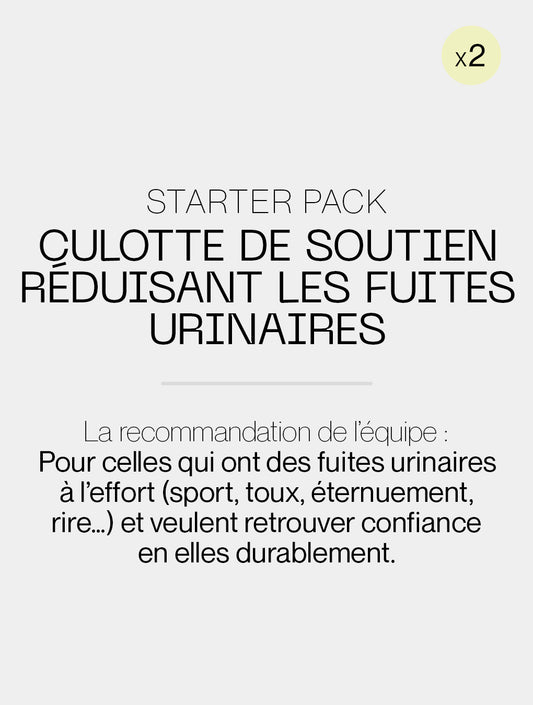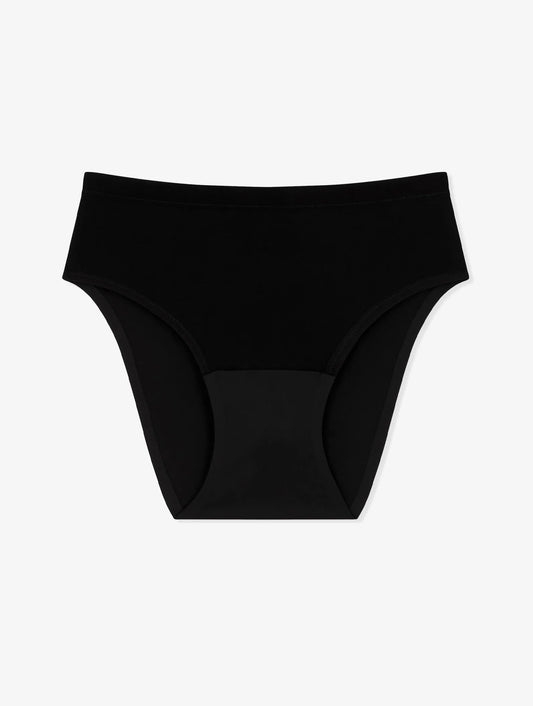Urinary leakage and coughing: why when I cough I pee
“When I cough I pee”: this is not an easy confession to make to your doctor or your friends. And yet, urinary leakage when coughing should not be taboo: this phenomenon of incontinence has its causes and treatments. It is linked to what is called “stress incontinence”.
Understanding stress urinary incontinence
Stress urinary incontinence (SUI) is characterized by involuntary loss of urine during activities that increase intra-abdominal pressure, such as coughing, laughing, lifting, or physical activities.
So if you say to yourself "when I cough I pee", know that these urinary leaks can be discreet to moderate and are often due to weakness of the pelvic floor muscles or the urethral sphincter. The risk factors for SUI can be multiple, including:
- age
- menopause
- overweight
- and the number of pregnancies.
SUI is the 2nd most common type of incontinence in women. Stress urinary incontinence is a reality for many women , which results in:
- leaking urine when coughing
- laughter
- jumps
- or other physical exertion.
Often linked to pelvic floor weakness, this phenomenon can be a source of embarrassment and discomfort. Let's find out the causes, available treatments and when to worry about urinary leakage.
Panties to better cope with this phenomenon of coughing which leads to urinary leakage
For those who face urinary incontinence when coughing, solutions exist to make this situation more manageable on a daily basis. Panties for urinary leakage are an increasingly popular option . They offer effective and discreet protection against leaks, while ensuring comfort and femininity.
Hygienic and odorless , they neutralize odors and keep you dry. Washable and reusable like period panties , they provide a more economical and ecological alternative.
Finally, there are also panties specially designed for specific situations like postpartum period panties .
Loss of urine when coughing: causes and risk factors

The causes of urine loss when coughing are diverse. They are mainly due to the weakening of the pelvic muscles and the urinary sphincter , which regulate the functioning of the bladder. This relaxation can be due to hormonal changes, such as those of menopause, or to muscle and ligament trauma linked to childbirth.
Risk factors include:
- age, especially after menopause
- overweight or obesity
- pregnancy, especially in cases of multiple pregnancies or difficult births
- prostate problems in men
- frequent and repetitive coughing or sneezing .
These factors further weaken the muscles involved, increasing the risk of urine leakage when coughing.
Coughing spells and urinary leakage: the specific case of 40-year-old women
In women aged 40, urinary leakage during a coughing fit is common and can be a sign of Stress Urinary Incontinence (SUI). This situation is often linked to weakness of the muscles of the perineum and can be amplified by certain factors such as the number of pregnancies, being overweight or menopause.
Thus, after one or more pregnancies, small urinary leaks may appear. It should also be noted that after menopause, 30 to 40% of women are affected by urinary incontinence.
However, this phenomenon, although embarrassing, is a relatively normal symptom from a certain age and should not be a cause for concern . Solutions exist to improve this situation and regain a satisfactory quality of life.
When to worry and consult for urinary leakage after coughing?
It's normal to wonder when to see a healthcare professional if you experience urinary leakage after coughing . Don't underestimate the impact of these symptoms on your quality of life . As a general rule, it is recommended to consult your doctor as soon as you notice urinary leakage.
If they become persistent, important or annoying in your daily life, do not hesitate to consult.
In addition, if you notice a worsening of symptoms or if you suffer from a chronic cough, it is best to make an appointment with a healthcare professional. Indeed, a persistent cough may have an underlying cause requiring specific treatment.
Remember that treatment for incontinence depends on the cause of the urinary leakage, the type of incontinence and the degree of discomfort experienced. Therefore, a medical consultation is essential to establish an accurate diagnosis and consider the treatment most suited to your situation.
Solutions to treat incontinence in women who cough
To treat incontinence in women that occurs after a cough and no longer worry about thinking "when I cough I pee" , several therapeutic options can be considered.
- Perineal rehabilitation is often the first step. Kegel exercises can help strengthen your pelvic floor muscles.
- The use of devices such as love balls can also be beneficial.
- In case of stress urinary incontinence, the installation of a suburethral support strip can be a solution.
- In some cases, surgery may be necessary.
- Medications can be used to treat certain types of incontinence, such as urge incontinence.
It is recommended to consult a doctor to determine the most suitable treatment for your situation as soon as the recurrence of peeing after coughing is established.
Natural treatments against urinary leakage after coughing: what to do?
Faced with urinary leakage when coughing, natural remedies can be considered.
- Perineal rehabilitation is a non-invasive method often recommended.
- Connected probes at home can help with perineal rehabilitation.
- It is recommended to limit the consumption of liquids in large quantities at one time.
- Certain plants can also be beneficial.
For example, cypress nut is recognized in herbal medicine for its astringent and vasoconstrictor properties. It can be consumed in the form of a soft extract or as a decoction before each meal.
Cinnamon is another natural ally against incontinence. It can be consumed in the form of herbal tea or by chewing a stick directly.
Preventing urinary incontinence: advice and best practices
To prevent urinary incontinence, there are several good practices to adopt.
- Adopting a balanced diet is essential. This helps preserve the vitality of the body and avoid excess weight, a risk factor for incontinence.
- It is also important to practice regular physical activity . This helps strengthen the perineum and abdominal muscles, which play a key role in bladder control after coughing.
- Quitting smoking can also help reduce urinary leakage. Indeed, smoking can cause a chronic cough which puts pressure on the bladder.
- Hydration is also important, but it is recommended to avoid drinking a lot in a short time. In case of nocturnal incontinence, it may be useful to reduce your fluid intake in the evening.
- Finally, adopting the right mindset is crucial. Urinary incontinence after coughing can affect anyone and it is important not to feel ashamed or isolated. Do not hesitate to speak to a healthcare professional for help and personalized advice.




